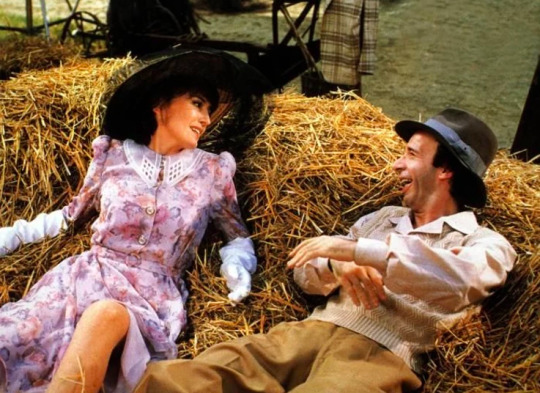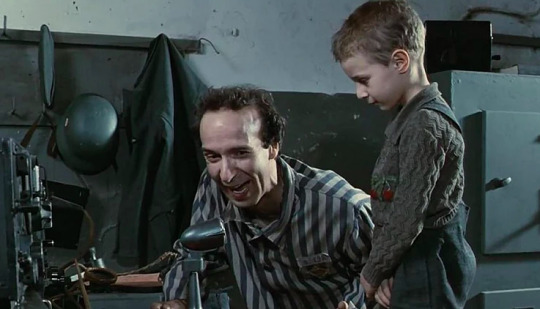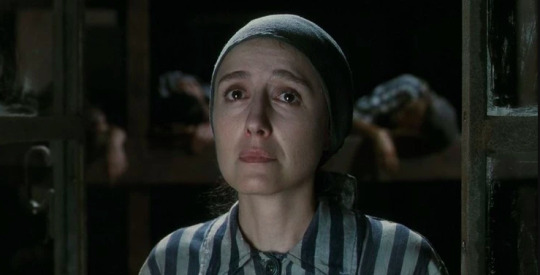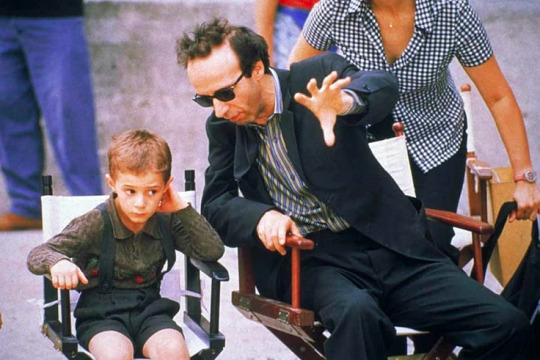#rubino romeo salmoni
Text
youtube
English Language Trailer for "La vita è bella"
#life is beautiful#we watched this in my ethics class#sophomore year#high school#buongiorno principessa!#so memorable#Youtube#in the end i beat hitler#Holocaust#jews#romani#LGBTQ#genocide#comedy#italian#foreign film award#roberto benigni#rubino romeo salmoni#fascism
0 notes
Photo

‘Life is Beautiful’, the beloved movie and winner of the Academy Award for Best Foreign Language Film, was inspired by Holocaust survivor Rubino Romeo Salmoni. Director Roberto Benigni read Rubino’s book, ‘In the End, I Beat Hitler’, based on his experiences as a survivor of Auschwitz, which inspired the magnificent picture. An Italian Jew, Salmonì was born in Rome in 1920. He escaped the first mass arrests of Jews from the Roman Ghetto in October 1943, but was arrested by the Italian police in April 1944. After being imprisoned in Rome, he was moved to a camp in Fossoli and arrived at Auschwitz when he was 24. He was given the identification number A15810, and forced to work, facing severe starvation and cold. Salmonì and other prisoners in the camp were freed by Allied forces in 1945. Salmonì was happily reunited with his parents, then quickly learned his brothers were murdered. Salmoni writes in his book: "I came out of Auschwitz alive, I have a wonderful family, I celebrated my golden wedding anniversary, I have 12 splendid grandchildren– I think I can say I ruined Hitler's plan for me."
Contributor: Lauren Brinkman
Humans of Judaism
22 notes
·
View notes
Text
The Poignancy of Life Is Beautiful - Review
The phrase ‘tearjerker’ really is an understatement when remembering the absolute power that this piece of cinema holds.

Roberto Begnini & Nicoletta Braschi in 'Life Is Beautiful' (1997)
Roberto Benigni’s ‘La Vita e Bella’ (Life Is Beautiful) follows the stark contrast of life’s purest celebrations and greatest despairs over the course of seven years. Haunting and touching, it stars Benigni as ‘Guido’, an Italian waiter in the late 1930s. However ordinary his life may seem, it is the joy and humour that is paramount. The second half of the film follows Guido’s descent, as it is now the second world war, and as a Jew, Guido and his family are sent to a concentration camp. Yet Guido’s optimism for life never seems to end, as he turns the war into a game for him and his son. As romance and tragedy intertwine, this slice of history is somehow prevalent today, allowing us to reflect on the highest qualities and the worst misery in life.
‘La Vita è Bella’ really does live up to its title in the first half of the film, as director, co-writer, and star Begnini paints a colourful picture of a free and impassioned life. Yet, in the second half, the film’s name becomes an eerie echo of what used to be, it being a haunting hope from before, as well as deeply disturbing upon knowing the fate of the story. As beauty, Dora, literally falls into the arms of Guido from a barn, a usually manic Begnini exclaims, ‘buongiorno principessa!’. As the two run into each other over and over, Guido’s infatuation turns into unconditional love. Right in the middle of the Second World War, Guido and Dora have a son and have started a beautiful life. Forever changed is Guido’s dazzling existence when he is sent away to a concentration camp, with his family following.

To protect his son from the true horrors of the Holocaust, he uses his expert humour and imagination to craft their experience into a game, with first prize being a tank.
The separation between the joyous and depressing sides of this film are characterised in many ways. Guido’s fairytale life is filled with beauty, as we see his home decorated with curious antique furnishings. He too works at fanciful parties in a hotel, and on Sunday nights he attends ravishing shows at the theatre. He is free to make his life as fun as it can be. Yet, the twist of fate comes when he and his family are involved in the Holocaust; whisked away to a concentration camp. Dora’s rich, red dresses turn into dull striped pyjamas, and Guido’s characterful, antique-filled home turns into a cold wooden bunk bed.

Roberto Begnini & Giorgio Cantarini in 'Life Is Beautiful' (1997)
As stark a contrast between love and hate there is throughout the film, Guido and Dora’s beautifully romantic relationship can be seen as light amongst the chaos. That love prevails, romance is timeless, and it is for certain that “life is beautiful”. When winning the Oscar for Best Foreign Language Film, Begnini closed his speech by quoting Dante, stating that, in making the film, he was impacted by “the love that moves the sun and all the stars”. The first half of the film is a pure celebration of the greatest aspects of humanity and a beautiful life, with the second half showcasing the very worst aspects of humanity.
To choose such a grim area of history allows Begnini to strongly juxtapose both light and darkness, as well as delivering a strong political message and inspiring lesson on the human condition. In an interview with The Guardian, Begnini spoke on the movie, defending its controversial take, stating:
“to laugh and to cry comes from the same point of the soul, no? I'm a storyteller: the crux of the matter is to reach beauty, poetry, it doesn't matter if that is comedy or tragedy. They're the same if you reach the beauty."
Many can take this point in reference to the movie as a controversial statement, given the history it focuses on. As Guido acts all through the holocaust to protect his son, this can either be seen as an act of bravery or foolishly bad parenting, dividing opinions on the movie. For example, one may detest the film as Guido lies to his son about the reality of what they are facing, whereas one may adore Guido’s high spirits and ways in which he keeps his son safe. Film critic Tom Dawson spoke on the film, stating that “the film is presumably intended as a tribute to the powers of imagination, innocence, and love in the most harrowing circumstances.” The point of the human condition that Begnini so cleverly focuses on is that throughout life’s heaviest sorrows, nevertheless, we are led to see which always wins - love.

Nicoletta Braschi in 'Life Is Beautiful' (1997)
Roberto Begnini’s life philosophy is one of a carefree nature and the beloved film he has created is personable to his own life. Writing the screenplay with Vincenzo Cerami, the film’s inspiration comes from the book 'In The End, I Beat Hitler', written by Rubino Romeo Salmoni, heavily focusing on black comedy. Begnini’s father explained his time working at a Nazi Labour camp in a humorous manner to his children, lightening the weight of the reality. Furthermore, Begnini’s co-star Nicoletta Braschi, who plays ‘Dora’, really is his wife in reality. These aspects of Begnini’s life, philosophies and inspirations all rolled into one make the cinematic experience all the more meaningful.

Roberto Begnini’s exquisite must-watch ‘life is beautiful’ encompasses the highest and lowest points imaginable. So cleverly contrasting love and hate, it is a purely poignant and striking lesson on the human condition. Begnini's film continues to remind us of the great beauty and suffering that comes with being alive. The phrase ‘tearjerker’ really is an understatement when remembering the absolute power that this piece of cinema holds.
Stars Out of Five: 4.5/5
1 note
·
View note
Video
youtube
La vida es bella EN VIVO - Marta Bolaños, Sixto Armas & La Trova
La vida es bella (La vita è bella en italiano) es una película italiana dramática de 1997, escrita, dirigida y protagonizada por Roberto Benigni. Benigni interpreta a Guido Orefice, un judío italiano dueño de una librería, que debe emplear su fértil imaginación para proteger a su pequeño hijo de los horrores de un campo de concentración nazi. La historia está parcialmente basada en la experiencia real de Rubino Romeo Salmoni, uno de los pocos judíos que pudo sobrevivir al Holocausto Nazi. Benigni dijo lo siguiente acerca de Salmoni: "Podría decir que tenía un aspecto feliz, que en su modo de ser, de presentarse, había un lado cómico especial", razón que permeó la creación del personaje de Guido Orefice. Romeo Salmoni falleció el 11 de julio de 2011 a los 91 años de edad.
0 notes